HANDBOOK
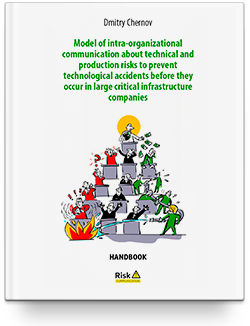
Model of intra-organizational communication about technical and production risks to prevent technological accidents before they occur in large critical infrastructure companies
Plekhanov Russian University of Economics, November 2023 (in Russian)/
ETH Zurich, February 2024 (in English)
ETH Zurich, February 2024 (in English)
The purpose of this publication is to describe a universal model for setting up a system in large critical infrastructure companies to allow the immediate reporting of technical and production risks from ordinary employees to top management, in order to prevent technological accidents before they occur. The mission of the model is the prompt transmission of high-quality information about the critical risks of production sites and pre-emergency situations along the management hierarchy of a critical infrastructure company, to prevent risks from escalating into full-blown emergencies. When an organization has limited resources, this system allows the executives to see the most vulnerable places in the company’s critical infrastructure and wisely distribute limited funds to prevent critical developments.
Abstract in PDF
HANDBOOK
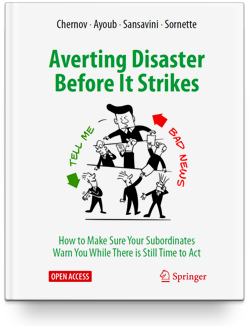
Averting Disaster Before It Strikes: how to ensure your subordinates warn you while there is still time to act
Springer, July 2023
This handbook is about how to transform the way large critical infrastructure companies communicate about safety and technological risks. It aims to support senior managers to get the information they need from their subordinates concerning the risks they are facing, in order to prevent accidents before it is too late.
Free download at
The recommendations in this handbook are based on interviews with 100 executives at various levels, working in 65 critical infrastructure companies around the world, in power, oil and gas, metals, chemicals and petrochemicals, mining and other industries. The recommendations of these leaders were also tested in the pilot project, in an industrial company which is the world leader in its sector. More than 400 managers at various levels of the corporate hierarchy, and employees at several of the company’s industrial plants, took part in the project. The handbook is written for the owners, senior managers, and industrial safety directors of critical infrastructure companies.
BOOK
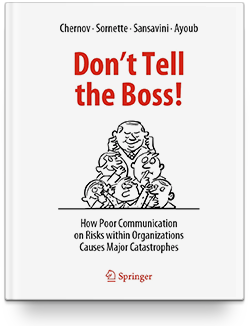
Don't tell the boss. How poor communication on risks within organizations causes major catastrophes
Springer, December 2022
What is the problem with communication about risk in an organization, and why does this problem exist? What stops people in organizations or project teams from freely reporting and discussing critical risks? This book seeks to answer these questions, starting from a deep analysis of 20 disasters where the concealment of risks played a major part. These case studies are drawn from around the world and span a range of industries: civil nuclear power, coal, oil and gas production, hydropower energy, metals and mining, space exploration, transport, finance, retail manufacturing and even the response of governments to wars, famines and epidemics. Together, case studies give an insight into why people hesitate to report risks – and even when they do, why their superiors often prefer to ignore the news. This helps to explain more generally why people dread passing on bad news to others – and why in the workplace they prefer to keep quiet about unpleasant facts or potential risks when they are talking to superiors and colleagues.
Buy at
BOOK
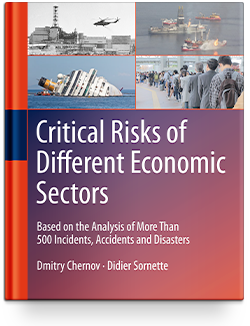
«Critical Risks of Different Economic Sectors»
Springer, January 2020
This book explores the major differences between the kinds of risk encountered in different sectors of industry - production (including agriculture) and services - and identifies the main features of accidents within different industries. Because of these differences, unique risk-mitigation measures will need to be implemented in one industry that cannot be implemented in another, leading to large managerial differences between these broad economic sectors. Based on the analysis of more than 500 disasters, accidents and incidents - around 230 cases from the production sector and around 280 cases from the service sector - the authors compare the risk response actions appropriate within different sectors, and establish when and how it is possible to generalize the experience of dealing with risks in any given industry to a wider field of economic activity. This book is mainly intended for executives, strategists, senior risk managers of enterprise-wide organizations and risk management experts engaged in academic or consulting work.
Buy at
BOOK
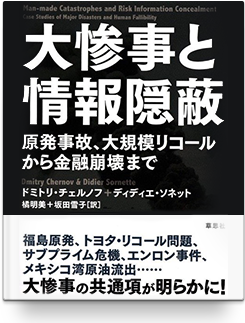
«Man-made Catastrophes and Risk Information Concealment»
Soshisha Publishing Co., August 2017
Japanese version of the book published by Soshisha Publishing Co.
Buy at
BOOK'S CHAPTER
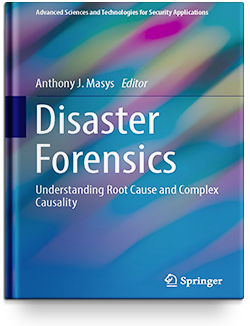
«Dynamics of Information Flow Before Major Crises:
Lessons from the Collapse of Enron, the Subprime Mortgage Crisis
and Other High Impact Disasters in the Industrial Sector»
Lessons from the Collapse of Enron, the Subprime Mortgage Crisis
and Other High Impact Disasters in the Industrial Sector»
Springer, September 2016
The analysis of the two largest financial disasters in the USA so far in the first decade of this century - the collapse of Enron in 2001 and the subprime mortgage crisis of 2007-2008 - suggests that the huge scale of these disasters stemmed from a lack of timely information. We present extensive evidence that regulators, investors and associates were not informed of the conditions and risks associated with the activities of Enron management in the first case, or with the assessment and underwriting of collateralized debt obligations (CDOs) in the second; and with little understanding of the "whole picture" of risks, they could not intervene decisively to prevent or minimize disaster. Moreover, we identify similar obstacles to the transmission of reliable risk information in past cases such as the Barings Bank crash, the Deepwater Horizon oil spill, the nuclear accidents at Chernobyl and Fukushima-Daiichi as well as in the current development of the US shale energy industry.
Buy at
BOOK
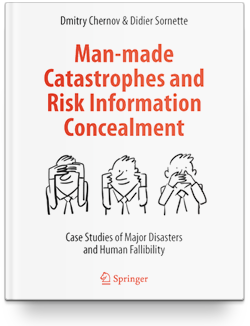
«Man-made Catastrophes and Risk Information Concealment»
Springer, November 2015
The book reveals the results of Dmitry Chernov’s doctoral research, which was focused on understanding the obstacles within organizations that prevented the transmission of truthful, relevant, accurate and understandable intra-organization and inter-organization risk information in 45 major past disasters and five ongoing risky cases. The Three Mile Island nuclear accident, the Bhopal pesticide plant gas leak, the Challenger Space Shuttle disaster, the Chernobyl nuclear disaster, the Exxon Valdez and Deepwater Horizon oil spills, the subprime mortgage crisis and the Fukushima-Daiichi nuclear disaster are some of the cases treated in detail in the book. The research identified more than 30 repeated causes of failures within the cases considered, and confirmed that most of the factors which obstruct the free transmission of risk information have been consistently present across many major disasters, which have occurred throughout the world and in different historical periods according to quite similar scenarios.
Free download at
DOCTORAL THESIS
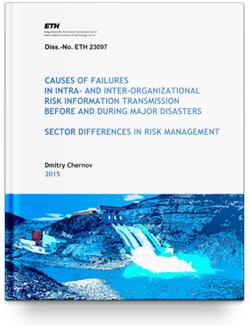
Doctoral thesis of Dmitry Chernov
(Doctor of Science in Risk Management of ETH Zurich (2015))
(Doctor of Science in Risk Management of ETH Zurich (2015))
«Causes of Failures in Intra- and Inter-organizational Risk Information Transmission Before and During Major Disasters. Sector Differences in Risk Management».
ETH Zurich, March 2013 - November 2015
The doctoral research of Dmitry Chernov consisted of two separate undertakings.
The first was a study of the causes of failures in intra- and inter-organizational risk information transmission before and during major disasters. The second was an investigation of sector differences in risk management.
Abstract in PDF
The first was a study of the causes of failures in intra- and inter-organizational risk information transmission before and during major disasters. The second was an investigation of sector differences in risk management.
HANDBOOK
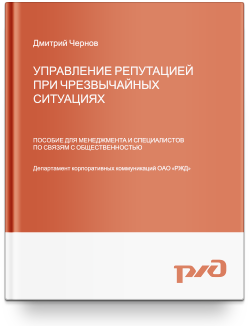
Handbook for executives and media representatives of Russian Railways
«Reputation management in emergency situations»
Russian Railways, August 2012
Table of content
ARTICLES
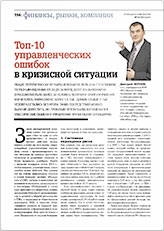
«Top 10 management mistakes in a crisis situation»
The Industrialist of Russia,
October 2011
October 2011
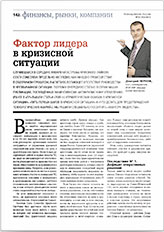
«Leadership in a crisis situation»
The Industrialist of Russia,
December 2011
December 2011
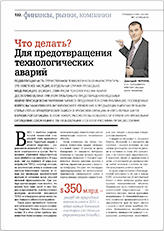
«What to do for the prevention of technological hazards»
The Industrialist of Russia,
January-February 2012
January-February 2012
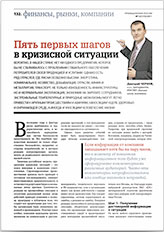
«First five steps in a crisis situation»
The Industrialist of Russia,
March 2012
March 2012
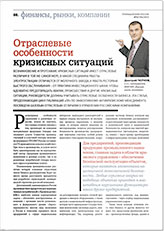
«Sector differences of crisis situations»
The Industrialist of Russia,
April 2012
April 2012
Additional books and publications of Dmitry Chernov on corporate strategy, general management, investor relations and service management are presented here.

